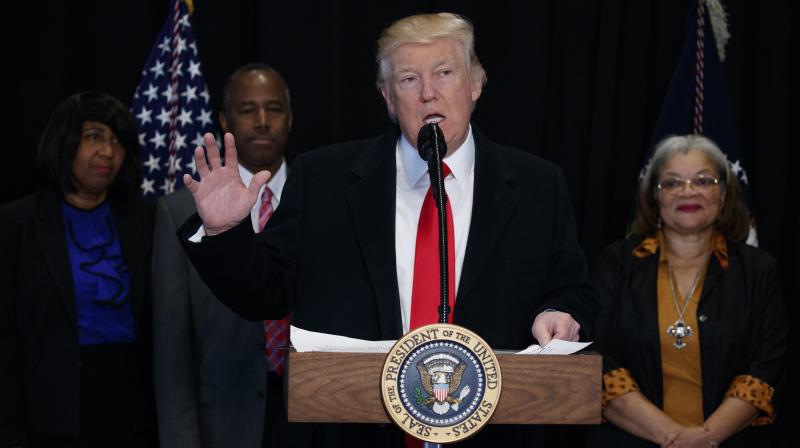World explores ways how to tackle Trump

America’s President Donald Trump, barely a month in office, continues to befuddle and provoke his perceived enemies, including purveyors of “fake news”, at home and allies, friends and antagonists abroad. The resignation of Michael Flynn, his controversial national security adviser, confirmed the impression voiced by senior Republican Senator John McCain that the Trump administration is in “disarray”.
Indian foreign secretary S. Jaishankar, speaking in Mumbai, advised that “we” should not “demonise” Mr Trump. While there is merit in that statement, his daily barrage of tweets, from two handles now — @realDonaldTrump and the official @POTUS — as well as monologue-based press conferences and political rallies have brought noise and more policy confusion. Japanese PM Shinzo Abe’s two quick trips to the United States to bond with Mr Trump worked by using flattery and cajolements like investing to upgrade US infrastructure, thus furthering the Trumpian agenda. Contrariwise, the Australian PM had a spat with Mr Trump over a US-Australia agreement to transfer some refugees.
However, pandering to Mr Trump is not always easy for democratically-elected leaders having own domestic constituencies. For instance, Mr Trump quoted Sweden as example of instability due to immigration. Swedish PM Carl Bilt trolled Mr Trump with a sharp tweet that there were “last year 50 per cent more murders in Orlando”, the Florida town where President Trump held his rally and has his estate, than in the whole of Sweden.
To convey policy cohesion and allay European concerns about President Trump’s unpredictability, the US sent a high-level delegation, consisting of vice-president Mike Pence and the secretaries for defence and homeland security, to the annual Munich Conference (February 16-19), a stage for debating trans-Atlantic issues. Europe has had growing concern over Mr Trump’s statements dubbing Nato “obsolete” or claiming the UK was “sensible” quitting the European Union or German Chancellor Angela Merkel “silly” for taking refugees. US defence secretary James Mattis’ assurances over continuing US commitment to Nato sounded unconvincing alongside demand for allies take more slack by upping defence budgets to two per cent of their GDPs.
Surprisingly, India was invisible at Munich, missing an opportunity to join the discourse on the future global security paradigm. Russian foreign minister Sergey Lavrov, sensing cracks in the Atlantic alliance, advocated a “post-Western world order”. The Chinese foreign minister too hobnobbed with the gathered Western diplomatic and security elite. With the external affairs minister still recovering from surgery and the national security adviser more attuned to national than international issues, India’s missing narrative circumscribes its role in shaping the global order.
Some themes of Trumpian doctrine are emerging, though their fine-tuning is still a work-in-progress. Take US-Russia relations for instance. Talk of a grand bargain in which Russia is ceded a zone of influence in Eastern Europe in exchange for a joint battle against ISIS, negotiated reduction of nuclear weapons, curtailment of China and Iran, appears flawed. For instance, Russia is fighting ISIS from the air with Iran and its allies handling ground operations. So how can Russia abandon its existing alliance with the Shias led by Iran to join the US? Similarly, while Russia will continue to be wary of China’s demographic push into its sparsely populated east, its strategic convergences outweigh its reservations. China is now a safe market for its fossil fuel resources and a counter-weight to Japan. Also, Russia, as a declining power, is upgrading its nuclear arsenal and considering abandoning the 1987 Intermediate-Range Nuclear Forces Treaty rather than espousing a nuclear weapon-free world. Trumpian theory and rhetoric are thus detached from the real world. Fortunately, his nominees in defence, state and national security are seasoned generals or oil industry stalwarts trying their best to marry his rhetoric to policy.
Where do South Asia and India fit into this developing scenario? Mr Jaishankar’s advice appears based on pre-emptive caution than a deliberate policy of quiet engagement. While there are areas of strategic convergence — such as Mr Trump wanting regional powers to take more responsibility to secure the global commons and India being a potential large market — he is unlikely to revise his core policy red lines. Two such disruptors to bilateral relations can be US immigration policy and Mr Trump’s approach to Pakistan and China.
India’s annual $100 billion-odd export of software services to the US rest on H1-B visas. Prime Minister Narendra Modi’s appeal to a 26-member bipartisan US congressional delegation earlier this week is unlikely to help. Mr Trump’s restructuring of immigration policy feeds into his white working class base. The Abe approach of adaptive defence would imply getting Nasscom to convince Mr Trump that by barring Indian software engineers he would not only add to the costs of US firms and diminish their competitiveness but may force Indian software companies to handle business out of India, with more jobs generated at their home bases. Mr Trump the deal-maker is known for bluster when opening his bid to improve his negotiating position. Polite counter-measures are the answer.
Pakistan, the amoral pragmatist, is already adjusting to possible pressure on its abetment of terror syndicates by action against Hafiz Saeed and the Jamaat-ud-Dawa and Lashkar-e-Tayyaba. Those groups and Jaish-e-Mohammed, whose chief Masood Azhar is so far untou-ched, may also be mutating into political outfits. But of importance to India will be whether Mr Trump is serious about containing China or is clenching fists to obtain bilateral concessions. Pakistan will fit in somewhere in that equation.
As India plays a waiting game, perhaps Mr Modi should consider golfing lessons for bonding with President Trump, like his friend Shinzo Abe — a game he wanted truant bureaucrats to abandon when he first moved to New Delhi over two and a half years back.

